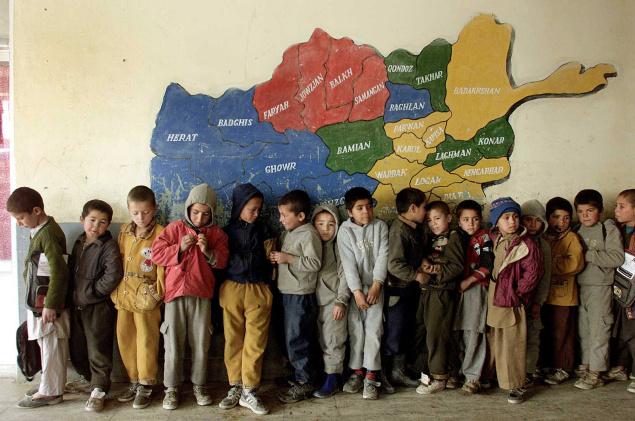By Akhtar M. Nikzad-According to Islam those are blessed and pious who support orphans. Such people are called friends of Allah. The religion of peace encourages people to build a society where orphans would not indulge in crimes for earning bread. Being depriving of parents’ hug is intolerable loss for every person, but it is very painful for needy children. Children need parents more than anything else to rejoice and start journey on the right path.
Father and mother have pivotal role in a family. They are the source of livelihood and educate their children. Parents are very tender minded for their children, in fact live without parents is an unpleasant reality that could not be altered.
Plus-three decades of war in Afghanistan took lives of millions of people. Millions of Afghans left the country while millions of children were left orphaned by the chaotic wars. Still many children fear about loss of parents in suicide attacks, insurgency, assassinations, roadside bomb explosions and traffic accidents. These unfortunate realities deprive the children from their father’s cuddle.
There are about 80 orphanages, 32 state-run and 48 private, in the country where 13,245 orphans including 4,100 females are turning their day into night without much hope for improvement in their lives.
According to Chief of the Orphanage Department, Sayed Abdullah Hashimi, the orphans accommodated in the orphanage centers make 10 percent of the all orphans in the country. Its mean 90 percent orphans stay in home or work on streets to live like free birds of sorrows.
How orphans are treated in the society as well as in the orphanage center, Afghanistan Times interviewed some orphans. Zarif, a 10-year old orphan, lives in an orphanage center. The teenager whose pale face was telling the untold stories of his unfortunate life told Afghanistan Times in shaky voice that he lost his father in a suicide attack in front of the Supreme Court last year. Narrating the ordeal it was visible from his wobbly tune that the memories of his father death are haunting him without any pause or break.
“My father was a carter when he was shifting the load on the street a suicide bomber detonated his explosives packed jacket,” recalled Zarif while taking short pause to clean tears that were rolling down on check which yet to shine with a genuine smile. “My father was killed. Our family has been ruined by those who don’t know us and we did not harm them,” he whimpered.
Father’s death has left deep imprints on Zarif’s mind, because if he was alive Zarif would have been in school instead of in a far away orphanage center.
“When I hear news on television about suicide attacks, I feel as my father has been killed there and lying at the site in a pool of blood. These news refresh the horrifying memories when people brought my father’s dead body in a coffin and everyone was crying. My mother was slapping her face. When I look at my friends in the orphanage center I feel no difference because they also lost their parents in terror attacks or in other incidents,” he said while bottling up his feelings to show his inner strength despite the great loss.
Arash, another nine years old child, chocked up when started talking about his life as an orphan. He said that his father was a driver and major source for the family to have food on the table but was killed on the Kabul-Kandahar highway when driving a vehicle. Life of Arash’s father was claimed by a roadside mine.
“The roadside mine not only deprived me of my father but also from mother and three elder brothers,” he lamented.
The orphanage centers if taken as a corner, one can see only bitter experiences and miserable life of orphans standing. Most of orphans lost their fathers as result of insurgency.
Currently, 90 percent of orphans live at home or work on the streets. However, no comprehensive and nationwide survey has been carried out to get correct information and glimpse of the ground reality. According to a survey carried out in 2009 survey, there are 120,000 orphans in Afghanistan.
Chief of the Orphanage Department, Sayed Abdullah Hashimi, in an interview with Afghanistan Times said the orphanages in the country can only accommodate 10 percent of the total orphans.
“The government does not allocate adequate budget to support the orphanages. It is not only about accommodating orphans but also about providing them all facilities that need such as food, healthcare and education,” he said while reflecting the unfortunate reality.
He said the government allocates around $3.4 million in the ordinary budget for orphanages which is used through the Ministry of Labor, Social Affairs, Martyrs and Disabled (MoLSAMD). “The amount cannot meet all the needs.”
Upset by the step-mother like behavior of the government, Hashimi told that spending budget through MoLSAMD created problems for the orphanages and they could not provide necessary services to the orphans and needy children.
“If the government cannot address our problems due to lack of budget then it shall request donors, humanitarian organizations and the national traders to help the orphans,” the heartbroken chief of the orphanage department urged those who are sitting in the corridors of power to do something about future of the orphans who desperately need help.
Responding to a query he said the orphanage department give shelter to those children who are either orphans, whose father is behind bars or addicted, children who could not be supported by family due to financial constraints, or children with no identity. About 70 percent of the children who are given shelter by the orphanages are orphans.
The most depressing reality is that the government is spending financial and human resources on projects that are short-term with no concrete results but has turned eye from the issues faced by the orphans. Perhaps, it is the reason that Nuristan, Uruzgan, Panjshir and Daikundi provinces are deprived of the orphan houses.
If the government and international community failed to embrace the orphans then it is feared that they would be approached by the militants. If this happens then the government would have to blame itself for surge in militancy and crimes, because the rejected and hapless children could go to extreme level to get what the authorities failed to give them—a loaf of bread with some respect.
 Afghanistan Times
Afghanistan Times




